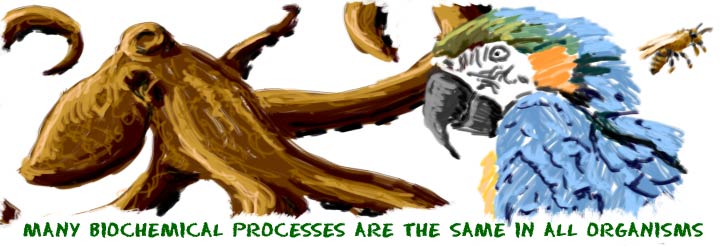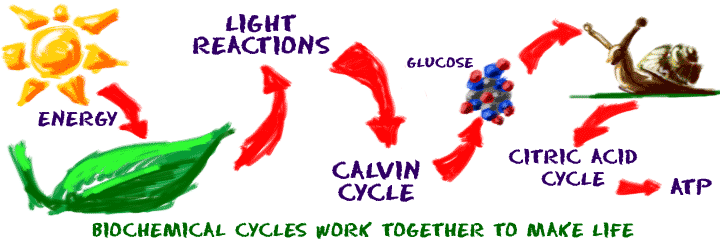
Biochemistry is one of the crossover fields of chemistry. Biochemists have to understand both the living world and the chemical world. Even if you don’t want to become a biochemist, you'll still have to understand atomsand molecules as a biologist.
The key thing to remember is that biochemistry is the chemistry of the living world. Plants, animals, and single-celled organisms all use the same basic chemical compounds to live their lives. Biochemistry is not about the cells or the organisms. It's about the smallest parts of those organisms, the molecules. It's also about the cycles that create those biological compounds.
Repeating Biochemical Cycles

You can probably guess that biochemical cycles repeat over and over. Those cycles allow living creatures to survive on Earth. It could be the constant process of photosynthesis that creates sugars in plants or building complex proteins in the cells of your body. Also, cycles rely onenzymes and other proteins to move the atoms and molecules. Understanding the helper molecules is as important as learning about the cycles themselves.
Every cycle has a place, and each one is just a small piece that helps an organism survive. In each cycle, molecules are used as reactants and then transformed into products. Life is one big network of activity where each piece relies on all of the others. A compound, such as an herbicide, may only break one part of one cycle in a plant. However, because everything needs to work together, the whole plant eventually dies.
Start with the Basics
We may have been talking about cycles to this point. However, we think it's important that you understand the different types of molecules you will find in biochemistry. We aren't going to go into the citric acid cycle and its ten steps. We won't even look at the eleven steps involved in the breakdown ofglucose. At your level of understanding, it's enough to know the difference between a steroid, an amino acid, and a carbohydrate. There will be plenty of time for you to memorize the pathways and the movement of molecules during each step of a cycle.Biochemistry and Organic Chemistry
Some of you may have heard about organic chemistry. It's a much broader field than biochemistry. It looks at every molecule that might have a carbon atom. You could be studying plastics, cellulose, gasoline, fats in your cells, or paint. Organic chemistry looks at many carbon-containing compounds beyond the ones found in living systems.We like biochemistry because we learn about things that are inside of us. We can relate to what happens when we eat and how our bodies are constructed. We can imagine how the molecules are moving around the mitochondria or chloroplasts, as opposed to chemical changes that make natural gas. If you choose a career in biology or chemistry, you will need to understand the information in both biochemistry and organic chemistry. Why? Because the movement of atoms in the bio-chem world follows the same rules you will learn in o-chem.








0 comments:
Post a Comment